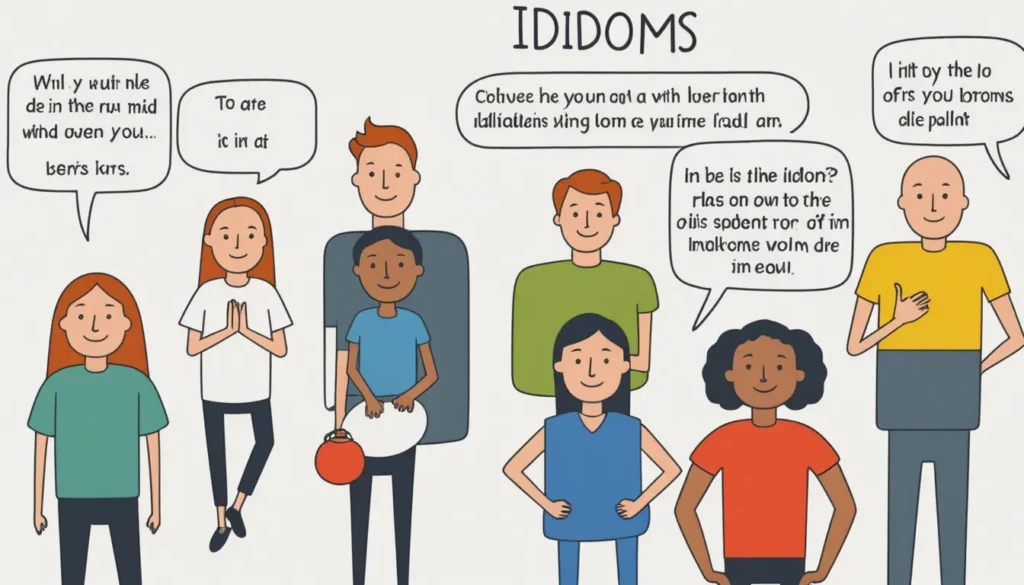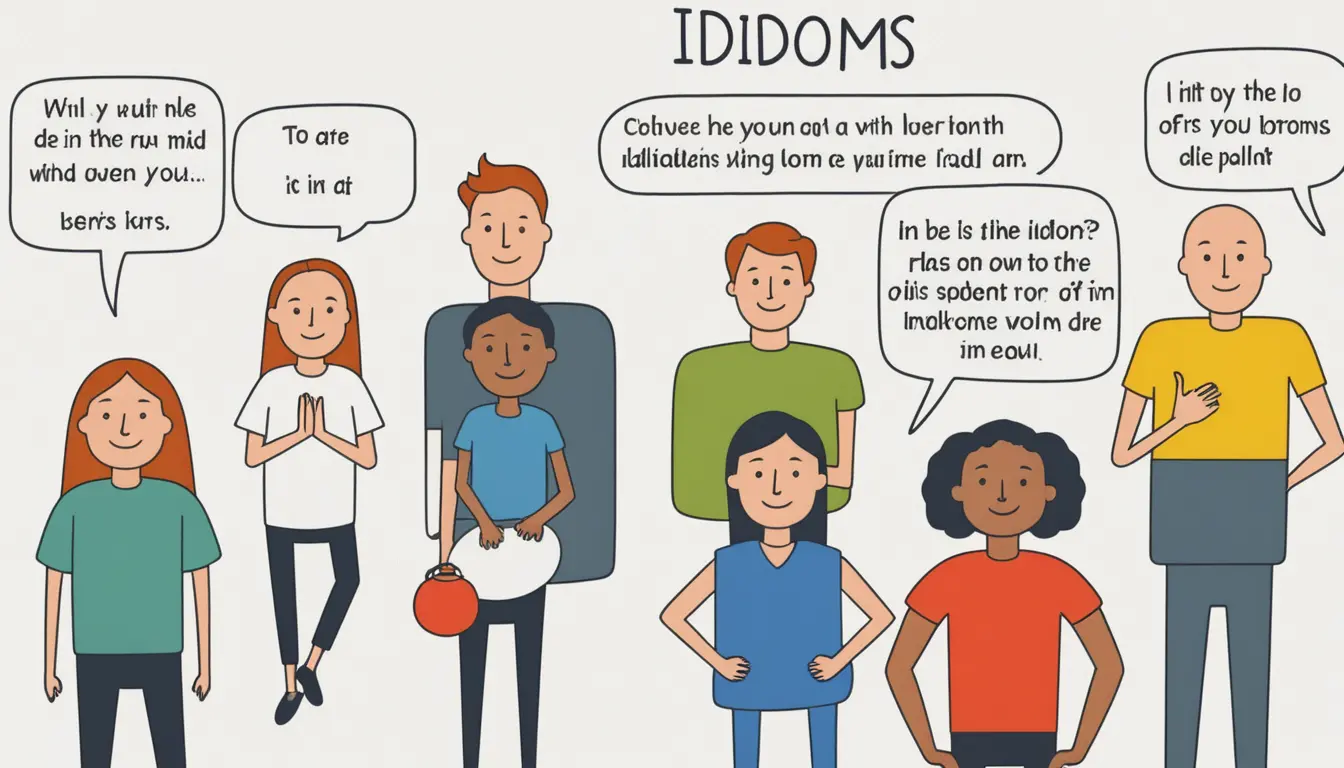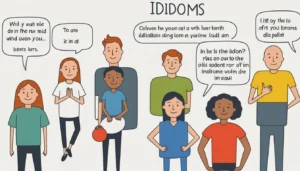100 idioms and their meanings: Phrasal verbs and idioms for all kinds of exams PDF 2024

Introduction
100 idioms and their meanings Idioms are the secret sauce of the English language, adding flavor and depth to everyday conversations. These colorful expressions often leave non-native speakers scratching their heads, but mastering them can take your language skills to the next level. In this comprehensive guide, we’ll explore 100 essential English idioms and their meanings, helping you navigate the sometimes confusing world of figurative language.
Why should you care about idioms? Well, they’re not just linguistic decorations. Idioms are woven into the fabric of English communication, appearing in casual chats, business meetings, literature, and media. Understanding and using idioms correctly can:
- Enhance your conversational fluency
- Help you grasp cultural nuances
- Improve your reading comprehension
- Make your English sound more natural and native-like
Whether you’re an English language learner or a native speaker looking to expand your linguistic repertoire, this guide will equip you with 100 must-know idioms, their meanings, and tips on how to use them effectively. Let’s dive in and start painting with all the colors of the English language!
What Are Idioms?
Idioms are phrases or expressions whose meaning cannot be deduced from the literal definitions of the words used. They’re linguistic shortcuts that native speakers use to express complex ideas quickly and vividly. For example, when someone says, “It’s raining cats and dogs,” they don’t mean actual pets are falling from the sky – it’s just a colorful way to say it’s raining heavily.
These expressions are deeply rooted in the culture and history of English-speaking countries, which is why they can be particularly challenging for language learners. However, understanding idioms is crucial for truly mastering English, as they appear frequently in both spoken and written communication.
Why Learn Idioms?
Expanding your idiomatic vocabulary offers several benefits:
- Enhanced Communication: Idioms allow you to express ideas more effectively and concisely.
- Cultural Understanding: Many idioms reflect cultural values and historical events, providing insights into English-speaking cultures.
- Improved Comprehension: You’ll better understand native speakers, literature, and media.
- Natural-Sounding English: Using idioms correctly makes your English sound more native-like and sophisticated.
- Mental Flexibility: Learning idioms enhances your ability to think abstractly in English.
How to Use This Guide
To make the most of this idiom collection:
- Read for context: Each idiom is presented with its meaning and an example sentence.
- Practice actively: Try using new idioms in your conversations or writing.
- Group similar idioms: Notice patterns and themes to aid memory.
- Visualize the literal meaning: This can often help remember the figurative meaning.
- Review regularly: Consistent exposure is key to retaining new expressions.
Now, let’s explore our list of 100 essential English idioms, grouped into five thematic sections for easier learning and reference.
Also, Check CSS Chronicles Magazine (47th Issue), June 2024 Edition
100 Common English Idioms and Their Meanings
Idioms About Success and Failure

- Hit the nail on the head Meaning: To describe exactly what is causing a situation or problem Example: “Your analysis of the company’s issues hit the nail on the head.”
- Break new ground Meaning: To do something innovative Example: “The scientist’s research is breaking new ground in cancer treatment.”
- Bite off more than you can chew Meaning: To take on a task that is too big or difficult to manage Example: “I think I bit off more than I could chew when I agreed to organize the entire conference by myself.”
- Go down in flames Meaning: To fail spectacularly Example: “His political career went down in flames after the scandal.”
- Get the ball rolling Meaning: To start an activity or process Example: “Let’s get the ball rolling on this project by scheduling our first team meeting.”
- Back to the drawing board Meaning: To start over after a failure Example: “Our initial design was rejected, so it’s back to the drawing board.”
- Climb the ladder Meaning: To advance in one’s career Example: “She’s ambitious and determined to climb the corporate ladder.”
- Pull it off Meaning: To succeed in doing something difficult Example: “Despite the tight deadline, we managed to pull it off.”
- Drop the ball Meaning: To make a mistake or fail to do something Example: “The team dropped the ball on the last project, missing several key deadlines.”
- Blow it out of the water Meaning: To surpass expectations, to do exceptionally well Example: “Her presentation blew it out of the water; the clients were very impressed.”
- Miss the boat Meaning: To miss an opportunity Example: “If you don’t apply soon, you’ll miss the boat on this job opening.”
- Raise the bar Meaning: To set a higher standard Example: “The new world record raises the bar for future athletes.”
- Go down like a lead balloon Meaning: To fail or be poorly received Example: “His joke went down like a lead balloon at the formal dinner.”
- Ace it Meaning: To perform exceptionally well, especially in a test or competition Example: “Don’t worry about the interview; I’m sure you’ll ace it!”
- Strike gold Meaning: To discover something valuable or have great success Example: “The company struck gold with their new smartphone design.”
- Fall flat Meaning: To fail to produce the desired effect Example: “Despite our best efforts, the marketing campaign fell flat.”
- Get a foot in the door Meaning: To achieve an initial stage that can lead to future success Example: “This internship could help you get a foot in the door at the company.”
- Pull the plug Meaning: To stop an activity or project Example: “After months of losses, they decided to pull the plug on the new product line.”
- Hit the ground running Meaning: To start a new activity with great energy and enthusiasm Example: “The new manager hit the ground running, implementing changes from day one.”
- Shoot yourself in the foot Meaning: To accidentally do or say something that causes problems for you Example: “By lying on his resume, he shot himself in the foot and lost the job opportunity.”
Also, Check Pakistan a hard day By Anatol Lieven, book summary 2024, Free PDF
Idioms Related to Money and Business

- Break the bank Meaning: To be very expensive or use all one’s money Example: “Don’t worry, this vacation won’t break the bank.”
- Bring home the bacon Meaning: To earn money, especially for a family Example: “As the sole breadwinner, she’s responsible for bringing home the bacon.”
- Cut corners Meaning: To do something most easily or cheaply Example: “The contractor cut corners on the building materials to save money.”
- Tighten your belt Meaning: To spend less money when there is not much available Example: “After losing his job, he had to tighten his belt and reduce expenses.”
- Making ends meet Meaning: To have just enough money to pay for the things you need Example: “With the rising cost of living, many families struggle to make ends meet.”
- Put all your eggs in one basket Meaning: To risk everything on a single venture Example: “Don’t put all your eggs in one basket; diversify your investments.”
- Red tape Meaning: Excessive bureaucracy or adherence to rules and formalities Example: “Starting a business involves cutting through a lot of red tape.”
- Cook the books Meaning: To falsify financial records Example: “The accountant was fired for cooking the books to hide the company’s losses.”
- In the red Meaning: To be in debt or losing money Example: “After a poor quarter, the company was in the red.”
- Cash cow Meaning: A business or product that consistently generates profits Example: “The popular smartphone model has become a real cash cow for the company.”
- Bang for your buck Meaning: Good value for the money spent Example: “This laptop offers the best bang for your buck in its price range.”
- Go through the roof Meaning: To increase dramatically, especially in price Example: “Housing prices have gone through the roof in the last few years.”
- Deep pockets Meaning: Having a lot of money or financial resources Example: “We need an investor with deep pockets to fund this project.”
- Penny-pincher Meaning: A person who is extremely careful about spending money Example: “My uncle is such a penny-pincher; he refuses to buy new clothes until his old ones fall apart.”
- Golden handshake Meaning: A large sum of money given to someone when they leave a company Example: “The CEO received a golden handshake worth millions when he retired.”
- Nest egg Meaning: Money saved for future use, especially for retirement Example: “They’ve been carefully building their nest egg for years.”
- Push the envelope Meaning: To extend the limits of what is possible or acceptable Example: “The new startup is really pushing the envelope with its innovative technology.”
- Bottom line Meaning: The final, most important factor or result Example: “The bottom line is that we need to increase sales or cut costs to remain profitable.”
- Get down to brass tacks Meaning: To focus on the essential facts or details Example: “Let’s get down to brass tacks and discuss the project budget.”
- Throw good money after bad Meaning: To waste more money in a failed enterprise that has already lost money Example: “Investing more in that failing business would be throwing good money after bad.”
Also, Check Zoology Jobs: Zoology Guide by Stephen A. Miller
Idioms About Time and Timing

- Beat the clock Meaning: To finish something before a deadline Example: “We worked overtime to beat the clock and submit the proposal on time.”
- In the nick of time Meaning: At the last possible moment Example: “The firefighters arrived in the nick of time to save the building.”
- Better late than never Meaning: It’s better to do something late than not at all Example: “I’m glad you finally finished your degree. Better late than never!”
- Once in a blue moon Meaning: Very rarely Example: “I only see my cousins once in a blue moon, usually at family reunions.”
- Around the clock Meaning: All day and all night; continuously Example: “The emergency room operates around the clock to treat patients.”
- The eleventh hour Meaning: The latest possible time before it is too late Example: “They reached an agreement at the eleventh hour, just before the deadline.”
- A race against time Meaning: A situation where you’re trying to do or complete something before a deadline Example: “Developing a vaccine for the new virus was a race against time.”
- Time flies Meaning: Time passes quickly Example: “It’s hard to believe it’s been ten years since we graduated. Time flies!”
- Kill time Meaning: To do something to make time pass, often when waiting Example: “I killed time at the airport by reading a book.”
- Like clockwork Meaning: With extreme regularity and precision Example: “The train arrives at 8:05 every morning, like clockwork.”
- At the drop of a hat Meaning: Immediately, without delay Example: “He’s always ready to help his friends at the drop of a hat.”
- Burn the midnight oil Meaning: To work late into the night Example: “She’s been burning the midnight oil to finish her thesis on time.”
- Turn back the clock Meaning: To return to the past or to a previous way of doing things Example: “Many people wish they could turn back the clock to their younger days.”
- Call it a day Meaning: To stop working on something Example: “We’ve made good progress, let’s call it a day and continue tomorrow.”
- Make up for lost time Meaning: To do something faster or more intensively because you started it late Example: “After recovering from his injury, he’s been training hard to make up for lost time.”
- Buy time Meaning: To do something to delay an event or action Example: “We need to buy time until we can find a permanent solution to this problem.”
- Time is money Meaning: Time is a valuable resource, and it shouldn’t be wasted Example: “Let’s keep this meeting short; remember, time is money.”
- A matter of time Meaning: Something that is certain to happen eventually Example: “With his talent, it’s only a matter of time before he becomes a star.”
- Beat someone to the punch Meaning: To do something before someone else does Example: “I was going to propose that idea, but my colleague beat me to the punch.”
- The early bird catches the worm Meaning: The person who arrives first or is well prepared has the best chance of success Example: “If you want to get a good parking spot, remember: the early bird catches the worm.”
Idioms Describing People and Personalities
- A wolf in sheep’s clothing Meaning: Someone who hides malicious intent behind a friendly or harmless exterior Example: “Be careful of that new colleague; he might be a wolf in sheep’s clothing.”
- Apple of one’s eye Meaning: A person who is very dear to someone Example: “His granddaughter is the apple of his eye.”
- Wet behind the ears Meaning: Inexperienced or naive Example: “The new intern is still a bit wet behind the ears, but he’s learning quickly.”
- Jack of all trades Meaning: A person who can do many different types of work Example: “My uncle is a jack of all trades; he can fix almost anything around the house.”
- Cold feet Meaning: To become nervous about doing something Example: “He got cold feet just before the wedding and called it off.”
- Thick-skinned Meaning: Not easily offended or upset Example: “You need to be thick-skinned to work in customer service.”
- A fish out of water Meaning: Someone who feels uncomfortable in unfamiliar surroundings Example: “As the only non-scientist at the conference, she felt like a fish out of water.”
- All bark and no bite Meaning: Someone who talks tough but doesn’t act tough Example: “Don’t worry about his threats; he’s all bark and no bite.”
- A bookworm Meaning: Someone who loves reading or studying Example: “Sarah’s such a bookworm; she always has her nose in a book.”
- A dark horse Meaning: A person who reveals unexpected talents or abilities Example: “The newcomer was a dark horse in the competition, surprising everyone with his skills.”
- A head in the clouds Meaning: To be impractical or daydream Example: “Pay attention! You always have your head in the clouds during meetings.”
- A rolling stone Meaning: A person who never settles in one place or job for long Example: “John’s been a rolling stone all his life, never staying in one city for more than a year.”
- Ace up one’s sleeve Meaning: A secret advantage or resource kept back until needed Example: “She always seems to have an ace up her sleeve in negotiations.”
- Lone wolf Meaning: Someone who prefers to be alone or act independently Example: “He’s a bit of a lone wolf; he rarely joins team activities.”
- Old hand Meaning: Someone with a lot of experience in a particular area Example: “Don’t worry about John managing the project; he’s an old hand at this kind of work.”
- Stick in the mud Meaning: A person who is old-fashioned or resistant to change Example: “Come on, don’t be such a stick in the mud. Try something new for once!”
- Tough cookie Meaning: A strong, determined person Example: “Despite all the setbacks, she’s a tough cookie and never gives up.”
- Eager beaver Meaning: A person who is very enthusiastic and hardworking Example: “The new intern is such an eager beaver, always asking for more tasks.”
- Odd ball Meaning: An eccentric or unusual person Example: “He’s a bit of an odd ball, but his unique perspective often leads to innovative ideas.”
- Cool as a cucumber Meaning: Very calm and relaxed, especially in stressful situations Example: “Even during the crisis, the CEO remained as cool as a cucumber.”
Idioms for Everyday Situations
- Break the ice Meaning: To do or say something to relieve tension or get conversation going in a social situation Example: “Let’s play a quick game to break the ice before the meeting starts.”
- Bite the bullet Meaning: To force yourself to do something unpleasant or difficult Example: “I know you’re scared, but sometimes you just have to bite the bullet and face your fears.”
- Cut to the chase Meaning: To get to the point without wasting time Example: “Okay, let’s cut to the chase – are you interested in the job or not?”
- Let the cat out of the bag Meaning: To reveal a secret accidentally or prematurely Example: “I didn’t mean to let the cat out of the bag about your surprise party!”
- Piece of cake Meaning: Something very easy to do Example: “The exam was a piece of cake; I finished it in half the allotted time.”
- Speak of the devil Meaning: Said when someone appears just as they are being talked about Example: “Speak of the devil! We were just talking about you, John.”
- Under the weather Meaning: Feeling slightly unwell Example: “I’m feeling a bit under the weather today; I might stay home from work.”
- When pigs fly Meaning: Something that will never happen Example: “He’ll apologize when pigs fly; he’s too stubborn.”
- Steal someone’s thunder Meaning: To take credit for someone else’s achievements or to overshadow their success Example: “I was about to announce my engagement, but my sister stole my thunder by announcing her pregnancy.”
- Elephant in the room Meaning: An obvious problem or difficult situation that people do not want to talk about Example: “We need to address the elephant in the room – our company’s declining sales.”
- Pull someone’s leg Meaning: To joke with someone, often by trying to make them believe something untrue Example: “Don’t believe him; he’s just pulling your leg about winning the lottery.”
- Raining cats and dogs Meaning: Raining very heavily Example: “Don’t forget your umbrella; it’s raining cats and dogs out there!”
- Throw in the towel Meaning: To give up, admit defeat Example: “After months of trying, he finally threw in the towel and closed his business.”
- Hit the sack Meaning: To go to bed Example: “It’s getting late; I think I’ll hit the sack.”
- Blow off steam Meaning: To release strong emotions, often through physical activity Example: “After a stressful day at work, I like to blow off steam by going for a run.”
- Spill the beans Meaning: To reveal secret information, often accidentally Example: “Come on, spill the beans! Tell us what happened at the meeting.”
- Kick the bucket Meaning: To die (often used humorously) Example: “I want to travel the world before I kick the bucket.”
- Break a leg Meaning: Good luck (often said to performers before they go on stage) Example: “You’ll do great in the play tonight. Break a leg!”
- Eat your words Meaning: To admit that you were wrong about something you said Example: “I said the project would fail, but now I have to eat my words – it’s a huge success.”
- Take with a grain of salt Meaning: To not take something too seriously or literally Example: “You should take his advice with a grain of salt; he’s not an expert in this field.”
Mastering Idioms: Tips and Tricks
Learning and mastering idioms can significantly enhance your English language skills. Here are some strategies to help you become an idiom expert:
- Learn in context: Instead of memorizing idioms in isolation, try to learn them within sentences or situations. This helps you understand how and when to use them appropriately.
- Group similar idioms: Organize idioms by theme or meaning. For example, group all idioms related to time or money together.
- Use visual aids: Create mental images or actual drawings to represent idioms. This can help you remember their meanings more easily.
- Practice regularly: Try to incorporate new idioms into your daily conversations or writing. The more you use them, the more natural they’ll become.
- Watch English media: Pay attention to idioms used in English movies, TV shows, and podcasts. This will help you understand how native speakers use them in real-life situations.
- Keep an idiom journal: Write down new idioms you encounter, along with their meanings and example sentences.
- Play idiom games: There are many online games and apps designed to help you learn and practice idioms in a fun way.
Conclusion
Mastering English idioms is a journey that can greatly enrich your language skills and cultural understanding. The 100 idioms we’ve explored in this guide are just the tip of the iceberg, but they provide a solid foundation for navigating the colorful world of English expressions.
Remember, learning idioms is not just about memorizing definitions. It’s about understanding context, appreciating cultural nuances, and being able to use these phrases naturally in your communication. As you continue to encounter and use these idioms, you’ll find that they add depth, humor, and authenticity to your English.
We encourage you to explore the vast universe of English idioms beyond this list. Language is always evolving, and new idioms are constantly emerging. Stay curious, keep practicing, and don’t be afraid to use these expressions in your conversations.
Have you encountered any of these idioms in real life? Do you have a favorite idiom that wasn’t included in our list? We’d love to hear about your experiences with English idioms. Please share your thoughts in the comments below, and let’s keep the conversation going!
Happy idiom hunting, and remember, practice makes perfect!
Read Online 100 idioms and their meanings: Phrasal verbs and idioms for all kinds of exams














Post Comment